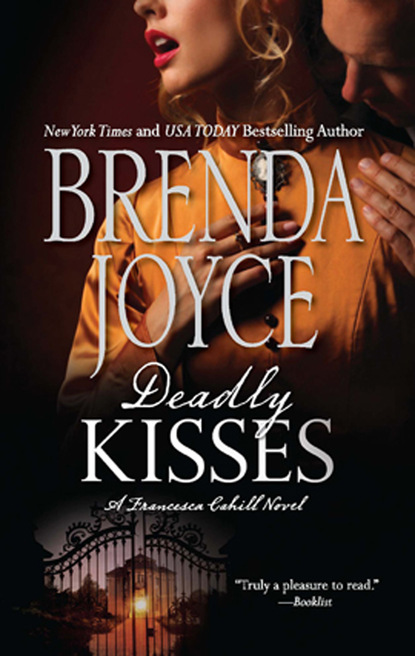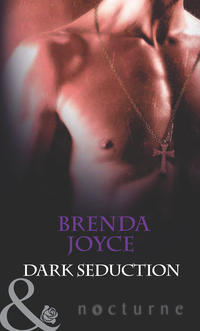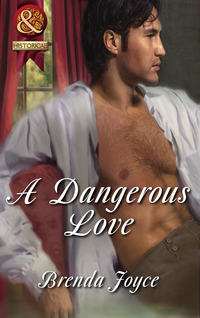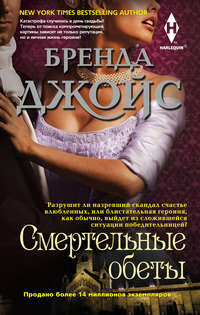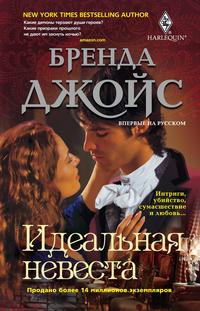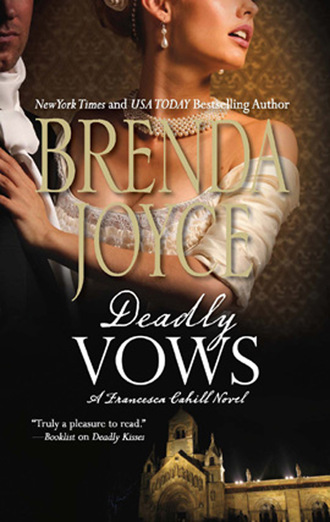
Полная версия
Deadly Vows
Francesca walked inside and saw nothing but receipts and notes on the desk. She looked carefully at the notes, but they were scribbles. Neither her name nor Hart’s jumped out at her. She looked at the saucer, which contained business cards.
Gallery Moore—Fine Arts and Consignments
Owned by Daniel Moore
No. 69 Waverly Place,
New York, NY
She rummaged through the drawers quickly, but there was simply too much paperwork to go through when the clock was ticking. The time. She froze, then reached for her purse, which she had laid on the desk. It was almost half past two.
Her temples throbbed. She did not have time to investigate now. But Bragg would be at her wedding and she would tell him everything before the ceremony, and send him downtown to retrieve the painting. But how could she leave the portrait now?
What did the damn thief truly want?
Francesca snuffed out the candle with her fingertips and left it on the desk—she had others in her purse. She took her gun from the waistband of her skirt. Purse in hand, in the darkness, she left the small office.
She thought she heard a small scraping sound coming from the front of the gallery.
She raced through the empty back chamber. “Who is there?”
There was no answer.
Frustration arose. She turned, jamming the gun into her waistband again, reaching with both hands for the oil painting. To her shock, it did not budge.
It wasn’t hanging on the wall by a wire; it was nailed.
She jerked on it again. It did not move.
And that was when she heard a lock clicking loudly in the dark.
She whirled to face the front door, expecting to see someone standing there, grinning at her. Instead, she saw a flash of movement outside of the gallery as someone ran up the steps to the sidewalk.
She cried out. Francesca ran to the door and seized it—but it was locked from outside as she had expected.
She cried out again, furiously, and tugged on the doorknob again. It did not budge.
Stunned, she stood there, the knob in her hands, the horror beginning.
She had just been locked in.
How was she going to get out? How was she going to get to her wedding?
CALDER HART STARED OUT of the window of the Fifth Avenue Presbyterian Church’s second-floor lounge, feeling very pleased. He was already in his tuxedo, although he had yet to don his tie. Fifth Avenue was deserted. Everyone who was anyone had left town for the summer—except, of course, for those at the uppermost crust of New York society who lived in awe—or fear—of Julia Van Wyck Cahill.
The avenue was terribly attractive this way, in such a state of splendid desolation, with only a single carriage and two black hansoms traversing its paved streets. Stately mansions, elegant townhomes, exclusive shops and clubs lined the thoroughfare. Only three coaches were parked outside the church; it was far too early for guests to arrive. He glanced at a grandfather clock in one corner of the dressing room. It was a few minutes past 3:00 p.m. His gaze wandered back outside. Surely he wasn’t looking for his bride—he was not superstitious, but he had no wish to see her before the wedding, just in case. He smiled to himself. He had little doubt that Francesca was already in the church with her sister and mother, frantically applying the finishing touches to her toilette, as if she could possibly be made any more beautiful.
A few months ago, if someone had told him he would be at a wedding as the groom, he would have been very amused—and he would have considered that person an absolute fool. Yet there he was, with a racing heart and a touch of nerves.
“Hey, Calder,” Rourke Bragg said, laughter in his quiet tone. “Are you planning a mad dash for the exit yet?”
He took one last look at the quiet avenue. Two roundsmen in blue serge, carrying billy sticks, were standing on the street corner, chatting. Hart suspected they would soon be directing traffic.
He slowly turned to face the young man who had spoken. Rourke took after his father, Rathe Bragg. He was tall and broad-shouldered, with golden hair, amber eyes and a sun-kissed, almost swarthy, complexion. He also had Rathe’s inherently sunny, optimistic nature. He was actually Rick’s half brother, but having been taken in by the Bragg family at the age of nine, when their mother died, Hart considered him a relation, if not a sibling of sorts.
He also happened to like Rourke, who was in medical school and was devoted to his profession. He had not one hypocritical bone in his body.
Speaking of hypocrites, Rick Bragg had yet to arrive. He had only spent a half an hour last night with them at the private room they had taken in the Sherry Netherland to celebrate the last of Hart’s bachelor days. Hart smiled grimly. He rarely bested his perfect brother. He had surely bested him now.
He would never forget that once, months ago, Rick had been smitten with his bride. But Francesca was marrying him.
The satisfaction welled. It was savage.
“He must be sweating bullets,” Rourke’s younger brother, Gregory, said. He was twenty years old to Rourke’s twenty-four, and currently clerking in San Francisco for his uncle, Brett D’Archand, a shipping magnate. Upon learning of the wedding, he had taken a train to New York. Hart had asked Rourke, Gregory and their younger brother, Hugh, to stand up with him, along with young Nick D’Archand. Gregory’s grin was smug. “My God, Hart, it’s all over after today. No more wild women, no more fantastic orgies, just shackles and chains. You must be mad.”
Hart slowly smiled. “If you are asking me if I have doubts, the answer is no.”
Everyone in the room turned to look at him. The only male in the wedding party who was not present was the father of the bride. Andrew Cahill was downstairs, pacing in the front hall. Hart knew he would meet every single guest personally. “It must be love,” Hugh Bragg snickered. He’d arrived from Texas two days earlier.
Hart was adept at ignoring conversations he wished to ignore, and he said, unperturbed, “I am marrying the most interesting woman on this planet. Need I say more?”
Francesca’s brother, Evan Cahill, smiled. “Even the mighty fall,” he murmured.
“Like I said…” Hugh laughed, reaching for a flute of champagne.
He was only fifteen, and his father adroitly removed the flute before he could take a sip. Scowling, Hugh accepted a root beer from Alfred instead.
Hart meant his every word. He had no doubts. He had realized, within days of meeting Francesca, that she was the most extraordinary of women. She was as brave as she was beautiful. Her intellect was astounding and she had more ambition than most men he knew. She was all that was good, pure and honest in the world, and he worried, because she was so trusting. He had never known anyone more selfless or more generous. She had shown him, time and again, that she could not turn her back on anyone in need.
She was also independent. Most men would hate her refusal to be subservient and obedient; he admired her willful, libertarian nature.
Of course, she was reckless and impulsive; no one had less common sense. But now that he knew how easily she leaped in front of runaway trains, he would be there to restrain her from her poor judgment. She had already caused him to grow a gray hair or two—and they had only known one another for five months.
He had first glimpsed her in Rick’s office on January 25, but he hadn’t spoken to her until an outrageous party on the rooftop of Madison Square Garden on January 31. By February 23, he had known that she was the one woman in this world who would never bore him. He had looked at her, realizing how much her friendship had come to mean to him, his heart lurching oddly. She had changed his world in a handful of days, and while he thought the human aspiration to acquire happiness incredibly trite, she had warmed his entire life. The decision made in an instant, he had abruptly informed her that he intended to take her to wife. Needless to say, Francesca had been in shock.
She had accepted his suit five days later.
It was almost impossible to believe that they had come this far. But he wanted to marry Francesca Cahill, and he always got what he wanted. No one acquired the wealth and assets that he had, coming from such stark and impoverished beginnings, without sheer will and unholy ambition.
He was even eager for their wedding night, although he tried to feign indifference, even nonchalance. He was so used to casually seducing the beautiful women that crossed his path that it had become a game of sorts. He hadn’t wanted to treat her like the others. Francesca, he intended to treat with respect. He had decided that he would not take her innocence until they had said their vows.
He had a moment of hesitation, almost a frisson of fear.
She thought him noble. That was her most astounding feature—her unshakable faith in him. She simply did not understand that he was motivated by self-interest—always. If he were truly noble, he’d tell her to find someone worthy of her—someone like Rick. But he would never do such a thing. She was his first and only friend. His best friend. Of course, he must have her entirely for himself.
She refused to see him as he truly was, and sometimes, that terrified him.
One day, he knew his world would implode—when she realized the truth about him.
And as he had that unhappy thought, the lounge door opened and Rick Bragg walked into the room.
Hart stared at his brother, who had given up all the finer things in life to pursue justice, equality and liberty for all. He despised his virtuous half brother, but he recognized that Rick was as selfless as Hart was selfish, a noble do-gooder. He truly wished to save the world, and it was not a show. Yet Rick was not the perfect gentleman, no matter how he might pretend to be. He had flesh-and-blood needs and dark desires, just like anyone else. Sometimes, Hart could not stand Rick’s attempt to cling to his moral code. When it crumbled, Hart thrilled. Unfortunately, those moments were rare. As unfortunately, the world needed men like Rick Bragg, just as it needed women like Francesca. Otherwise, the world would be a living hell.
He just wished that Rick were not his half brother. He was good, Hart was bad. He was loved, Hart was not. Rick was the insider, the wanted one; no matter his wealth and power, Hart was always the outsider.
Mostly, he hated the fact that Rick had seen, courted, kissed and loved Francesca first.
Rick looked grim. Hart did not smile now. Rick was perfect for Francesca. They were exactly alike—two radical, reforming, saintly peas in a pod. He had always thought that they were perfect for one another. But Francesca had chosen him.
He tensed. “Hello, Rick. I really didn’t think you would come.” He had won this battle. He might as well relish the fact.
Rick did not smile in return. “I debated declining.”
He approached, feeling predatory. He was not a hypocrite; he had not asked Rick to stand up with him. “And what, pray tell, changed your mind? Surely you do not wish to celebrate my union with Francesca?”
“I saw Francesca this morning.”
Hart started. He did not like being taken by surprise.
“She remains dazzled by you. But then, you know as well as I do that she is trusting and naive.”
His fists clenched involuntarily. “She came to see you?” Why would she go to Rick on the morning of their wedding? Oh, he knew why!
Rick stared. Finally, slowly, he smiled. “No, Calder, I went to see her. I wanted to persuade her to delay the wedding. I am afraid for her.”
He inhaled. For one moment, he had been blinded with jealousy; for one moment, he had thought that Francesca had doubts. “I am going to take care of her—in every possible way.” He let the ugly innuendo hang.
Rick flushed. He lowered his voice and said, “And for a while, she will be even more smitten, won’t she? But one day, passion will not be enough.”
Hart wanted to tell him to get out. But within half an hour, he would be exchanging vows with his bride and he wanted Rick there, suffering through it—as jealous as he himself had just been.
“You know I am right. You broke it off with her after Daisy was murdered, to protect her from yourself. You should do the right thing now. Call off the wedding.”
Hart smiled, and it felt ugly. He had broken their engagement when he had been arrested for his mistress’s death. He hadn’t wanted her ruined by association with him. He would never be able to live with himself if he brought her down that way. “I am not under arrest now. I am not in jail. I am not a suspect in a murder. In fact, what I am is one of the country’s wealthiest millionaires.” He couldn’t help thinking that Rick was acting as if he still loved the woman Hart was about to marry. His half brother had been detoured by the return of his wife and his lust for her, but lust wasn’t love and it did not last for very long. Besides, Rick was no fool. The blinders were clearly coming off. Leigh Anne was as weak and selfish as Francesca was strong and good. Sooner or later, he would realize the mistake he had made—if he hadn’t already realized it.
He continued viciously. “I am going to give Francesca the life she deserves—a life of intellectual freedom, with all the power she needs to do as she wishes, when she wishes. Nothing and no one will stop me, and certainly not you. In a few more moments, we will stand before Reverend Cramer and exchange our vows to become man and wife. Tonight I will consummate that union, and no man—not even you, Rick—will be able to come between us. In a few more days, we will be on our way to Paris on our honeymoon. Did you know I bought the vessel that will transport us across the Atlantic?” They would be its only passengers.
Rick flushed. “Lust isn’t love. And you don’t have a clue as to what the latter is.”
“And you do?” Hart mocked. “Is the lovely Leigh Anne downstairs—or upstairs, in your bedroom?”
Rathe came to stand between them. “I cannot believe that the two of you are carrying on the way you did as small boys!” He glared at Hart. “You are provoking him, when you know he has strong feelings for Francesca.” He glared at Rick. “You are married, and your wife deserves more. Today is Calder’s wedding day—for better or for worse!”
“I am afraid for her,” Rick said, not even looking at Rathe. “He will destroy her, either slowly or in one fell swoop.” He turned on his heel to leave.
“Rick. Don’t bother to attend the ceremony,” Hart said softly, furious now. Rick was wrong. He would never hurt Francesca. He just hoped his black past wouldn’t ruin them, as it had almost done so recently.
Rick turned back to face him. “I apologize. I gave Francesca my blessings this morning, and I meant it. I want her to be happy. That means I want both of you to have a successful marriage. I am hoping you will be a good and devoted husband.” He flushed again. Clearly, the words pained him.
Hart raised his brows, incredulous. “You are giving me your blessings?”
“Unlike you, I prefer taking the high road.” Rick stared, his expression hard and tight. “I am trying, no matter how difficult you make it.”
Hart had to laugh. “Of course you are—you are so damn noble!”
Rourke shoved a scotch at him. “Drink it. He has apologized, and you should bury the hatchet, at least for the rest of the day.”
Hart took the scotch, but did not bother to take a sip. He was utterly amused. Only Rick would sincerely offer him his blessings. He wondered how noble his brother would be later that night, after he and Francesca had gone home to finally and thoroughly make love to one another. He hoped Rick would stay awake, brooding unhappily about it.
A knock sounded on the lounge door and Gregory went to open it. The moment Hart glimpsed Julia’s starkly white face, with Connie standing behind her fearfully, his heart turned over with sickening force. He glanced again at the grandfather clock. It was 3:30 p.m.
“Julia?” Rathe hurried forward. Hart saw Rathe’s wife, Grace, standing with Julia—her arm around her, as if she might collapse.
“I don’t know where she is!” Julia cried. “Francesca isn’t here, she isn’t at the house, and no one has seen her since noon!”
Hart felt the room still. All conversation ceased. Time stopped.
Francesca wasn’t there.
Of course she wasn’t. There wasn’t going to be a wedding—and he wasn’t even truly surprised. She had come to her senses at last.
CHAPTER THREE
Saturday, June 28, 1902
4:00 p.m.
HER THROAT WAS raw from shouting for help. Francesca leaned against the door of the gallery, blinded by a sudden surge of tears. How was she going to get out? She had been crying for help for a very long time, and no one had heard her. What time was it, anyway?
She could barely believe that she remained locked inside. Trembling, she turned to find her purse. She had dropped it on the floor when she had heard the front door being locked. It was on the other side of the central wall where her nude portrait hung. For one moment, Francesca stared through the shadows in the gallery at her own sultry image.
She had been lured to the gallery and now, she was locked inside.
Someone wanted her to miss her own wedding.
There was no other conclusion to draw. She was not going to miss her own wedding! Somehow she was going to get out of this damn basement. She loved Calder Hart—she could not wait to finally be his wife. She would never leave him standing at the altar, in shock, waiting for her!
As she stumbled into the other chamber behind the wall, she wondered who had done this.
She had made many enemies in the course of the past six months. Every crime that she had solved had involved justice for the perpetrators. The list of those who wished to hurt her was probably long. She would consider it the moment she was out of the gallery and uptown—finally married to Hart.
Her purse lay on the floor, open. Francesca knelt and dug within for her pocket watch. Her heart slammed when she saw that it was a few minutes before four.
By now, her family, friends and three hundred guests were at the church. Everyone—including Hart—must know that she had not arrived.
Surely he was worried about her! She wished she had left a message with Alfred; she wished she had shown Connie the damn note. But she hadn’t done either of those things and no one would have any idea where she had gone.
She must have been screaming for help for perhaps an hour, hoping a passerby would hear her. Clearly, the gallery was set too low below the sidewalk, and too far back from it, for anyone passing to hear her. There had to be another way to get out.
Francesca dismissed the notion of trying to escape through the front windows, as they were barred. She ran back into the office, praying that the windows there were not as small as she recalled.
She stared up at the two windows, which were high up on the wall near the ground level, just below the office’s ceiling. They were small rectangles that barely allowed any light in. Each was probably eighteen or twenty inches wide. They looked half as tall.
She was a slender woman, but even if she could get up to the windows and break the glass, she feared she would not be able to squeeze through. She shuddered. If it weren’t her wedding day, she would continue calling for help—and wait for someone, eventually, to hear her. But she was going to take her vows, even if she was late—which now, obviously, she would be.
Francesca glanced around. She quickly realized she must push the desk to the wall, beneath the window, and stack the file cabinet on the desk, in order to make a ladder. The desk looked small enough, but it was surprisingly heavy, and it was many moments later before she had pushed it across the small space. She cleared the desktop with a determined sweep of her arm. Then she marched to a file cabinet. She pushed it across the floor, then managed to lift it onto the desk. Her back felt broken. Panting, she paused and looked up.
Francesca stared up at the window grimly. If she got stuck in that window, she could hang there all night. The possibility was distinctly dreadful.
But there was no other choice. Determined, she removed her shoes and stockings, the better to gain some traction, and climbed onto the desk. She tested the cabinet for balance by jiggling it. It sat square on the desk and seemed steady enough. Hiking up her skirts, she climbed onto it, clawing the rough wall with her fingers. She paused. She wasn’t afraid of heights, but she was now six feet from the floor and she did not think her makeshift ladder all that trustworthy. She sighed. Very slowly, she tried to stand up.
The file cabinet rocked.
She froze, regained her balance and tried again. A short time later, she was standing upright, her fingertips now grasping the shallow concrete ledge of the window, which was about four inches wide. Her face was level with the glass pane, which was thick and dirty. Her heart was thundering, but she was briefly exultant.
Then she grew grim. The window opened onto a grassy patch of backyard, or some such thing. She thought she could fit through it, but wanting to get through it was one thing, actually doing so, another. Once she broke the glass and cleared it away, she was going to have to jump up and try to get her chest onto the ledge, at least. If she failed, she was going to fall to the floor.
Francesca slowly, gingerly reached with one hand into the waistband of her skirt for her gun. The cabinet she stood on teetered slightly, but she felt that it was stable enough for her next move. Raising the gun slowly, she inhaled and slammed it with all her strength into the glass.
It shattered.
She covered her face with her arm, turning away. She felt shards dart against her cheeks anyway.
The rocking cabinet stilled. Her heart was pounding hard, but somehow, she was still standing on the cabinet. She took a few steadying breaths, then used the gun to clear away the remaining glass. The edges of the frame were dangerous—there was no way to make them shard free. But she intended to ignore a few scrapes and cuts. This was her wedding day.
She told herself not to look down. Francesca put the gun through the window and laid it outside on the grass. Then she reached with both hands for the ledge. There was nothing to really grab on to, and she was afraid that she wasn’t strong enough to hoist herself up high enough to begin to get out the window.
But she had to try.
She leaped up, pushing with her legs and her arms. For one moment, she thought she had made it. Her breasts hit the concrete and she was briefly suspended there. And then she was falling wildly downward, through the air.
SHE HAD COME TO her senses, realizing the folly of marrying him.
It seemed as if the floor were tilting wildly beneath his shoes. Then he felt a hand on his shoulder. Rathe, who had clasped his shoulder, said rather inanely, “What do you mean, she isn’t here? Where is she?”
He tensed, facing Francesca’s frightened mother. Julia was deathly pale. She moaned—a sound she had undoubtedly never before made in public. Behind her, Grace and Connie were almost as ghostly as she was. “She isn’t here, Rathe,” Julia gasped. “She was last seen at noon, hailing a cab. I do not know where she is!”
A terrible, shocked silence fell. He finally achieved a single coherent thought. Francesca had hailed a cab at noon. A new, darker tension began. Had she run away? He glanced from Julia’s white face to her sister’s. Lady Montrose seemed very frightened. He turned to look at Rick, who was clearly as surprised as anyone.
She hadn’t run away with his half brother, he somehow managed to think, because Rick was right there. But she had run off.
He felt the stares in the room, all leveled at him. He did not look at anyone now. The shock remained, but there was disbelief, as well.
She had run off.


